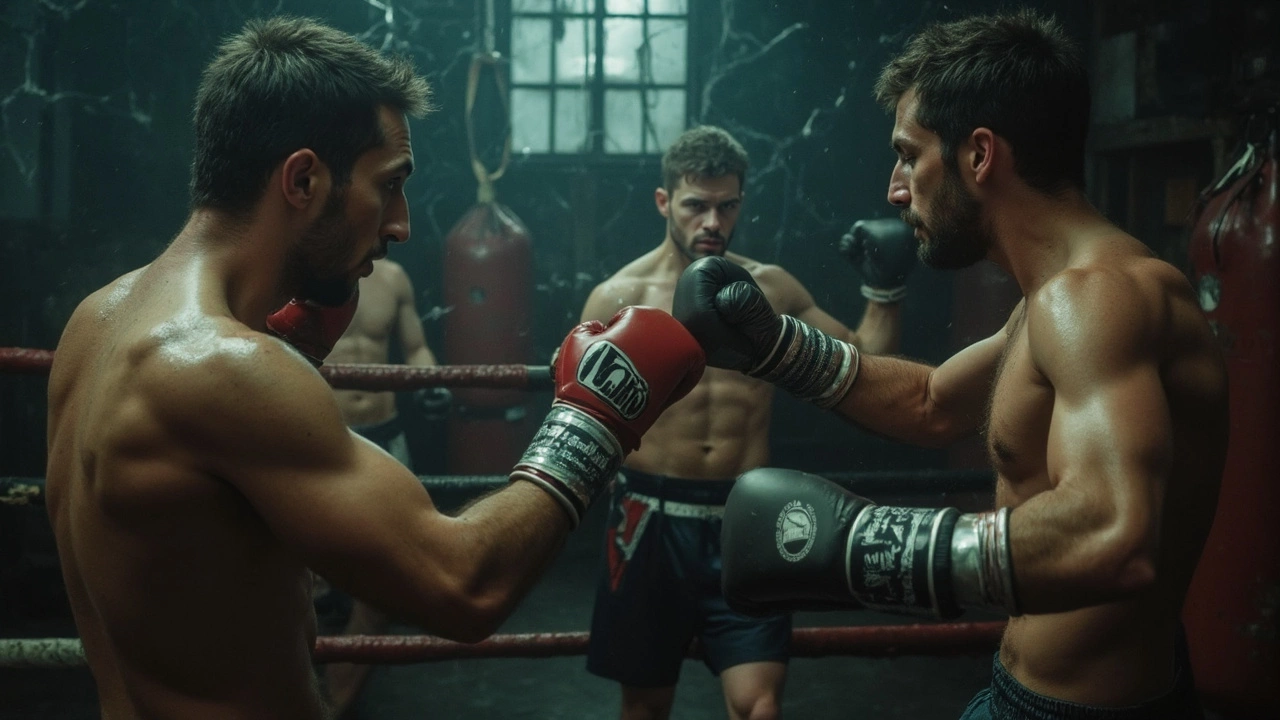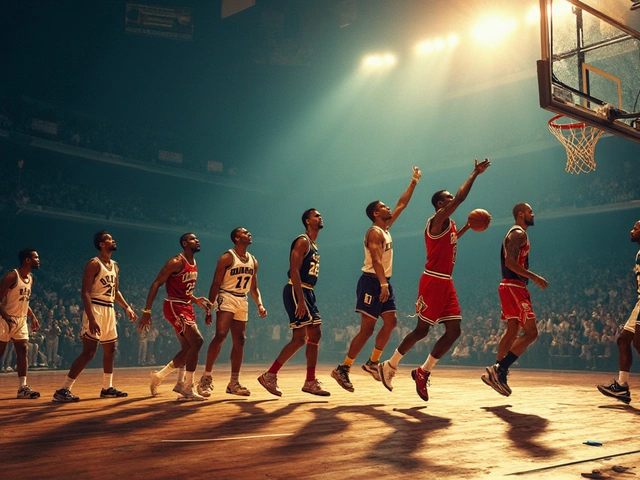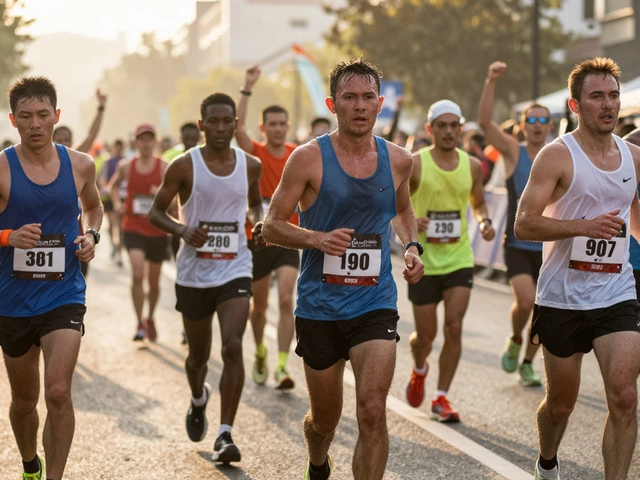
Boxing Matches May 14, 2025
Why Is Boxing Hard? The Real Struggle Inside the Ring
You've probably watched a boxing match and thought it just comes down to two people throwing punches. The truth? Boxing is way tougher than it looks on TV. The first day you step in the gym, you’ll realize something most people don’t get—throwing a punch for three minutes straight is exhausting. Your lungs burn, your arms feel like concrete, and you can't believe anyone survives twelve rounds at that pace.
Even before anyone lands a punch, the training itself is enough to test you. You’ll be skipping rope, shadowboxing, running miles every day, and hitting the heavy bag until your knuckles ache. The crazy part? That’s just the warm-up. If you want to know what makes boxing hard, start with the idea that you can’t hide when you’re tired. The guy across from you sees everything—if you drop your hands for a second, you’re getting hit.
- What Makes Boxing Brutal
- The Physical Toll No One Talks About
- Mental Warfare Every Fight Brings
- Tips to Survive Your First Real Match
What Makes Boxing Brutal
People throw the word 'tough' around, but boxing redefines it. It’s not just about taking a punch—anyone can get hit. What sets boxing apart is how it demands everything at once: speed, power, reflexes, strategy, and stamina all packed into short, high-stress rounds.
A real fight isn't just swapping punches. You deal with pain, exhaustion, even fear. It’s all happening while you try to keep your technique. Your brain is yelling at you to cover up, but you’re supposed to find openings to hit back. A study by the Cleveland Clinic found that pro boxers throw an average of 40-60 punches per round. Now imagine dodging, weaving, blocking, and countering at that speed for up to 36 minutes with barely any let-up.
The rules are simple, but that’s what makes it brutal. You have almost no protection—just gloves, a mouthguard, and maybe headgear in training. The majority of injuries are to the face and hands. And those ribs? They take a beating too. According to data from the American Association of Neurological Surgeons, about 90% of boxers experience facial injuries at some point in their career.
You don’t just need muscle; you need lungs and a brain that stay sharp under pressure. Every round, you’re burning a massive amount of calories and losing water fast. Some boxers lose up to 5% of their body weight during a single intense match, mostly from sweat. That makes the later rounds a gritty test of who can push through the pain longer.
To sum it up, boxing is brutal because it hits you everywhere—physically and mentally. You can train for months and still get completely humbled in three minutes by someone who's just a little faster or smarter than you.
The Physical Toll No One Talks About
People see the highlight reels—powerful knockouts, quick footwork—but most don’t realize what a boxer’s body pays for those moments. Every round puts stress on joints, muscles, and even your brain. You know how running a mile can leave you panting? Try doing that while dodging punches and constantly tensing up.
Constant impact is a real problem in boxing. Each punch, whether you dodge it or absorb it, takes a toll. Hands swell, ribs bruise, jaws ache. Pro boxers have broken hands, cracked noses, or worse—detached retinas from repeated hits to the head. Even amateur boxers are used to nosebleeds and headaches after a hard sparring session.
There’s also the day-after soreness, which feels different from any normal workout. Your back, neck, and even your calves ache from moving nonstop. Rest days almost feel pointless because the next session just restarts the cycle. It’s no wonder a lot of fighters use ice baths, compression, and massages just to keep training.
Then there’s weight cuts. Before a match, boxers often drop a scary amount of water weight in just a few days. Picture sweating in saunas, skipping meals, and running in sweat suits. It’s brutal, and if not done right, it can mess with your strength and focus once you finally step into the ring.
- Chronic hand and wrist issues are so common that some pros wrap their hands for even a simple bag session.
- Concussions and memory issues can build up over years, even if you’ve never been knocked out.
- Boxers regularly deal with split lips, busted eyebrows, and broken noses—some see it as just part of the job.
This isn’t about showing off scars. It’s about understanding that behind every match, there’s a hidden bill—and every fighter pays it in pain, sweat, and sometimes lasting injuries.

Mental Warfare Every Fight Brings
Boxing isn’t just about swinging your fists. Every match is a mental battle from start to finish. You’re not just fighting your opponent—you’re fighting nerves, self-doubt, and the constant worry about making one mistake that ends everything. That inner stress can hit harder than any punch, and it shows up way before the first bell.
The pressure ramps up days before the fight. A 2021 survey of amateur fighters showed that 68% experience sleep trouble the week leading up to their bout. The mind races with questions: Did I train enough? What if I gas out? Can I take a real punch? Even pros talk about feeling anxious. Mike Tyson, for example, used to admit he cried before matches because of the mental buildup.
Once you get in the ring, it gets even trickier. You need to stay focused, watch for patterns, and remember your game plan while getting punched in the face. Distraction for half a second can change the whole fight. The crowd noise, your coach’s shouting, and the ref—all that can break your focus if you’re not prepared.
- Reading your opponent: Spotting tiny shifts in the other boxer’s stance or eyes can tell you what punch is coming next.
- Managing fear: Feeling scared is normal. The best fighters recognize it and don’t let it freeze them.
- Controlling anger: Getting mad might make you sloppy. Smart boxers stay cool.
| Mental Challenge | How Many Boxers Struggle (%) |
|---|---|
| Performance anxiety | 76 |
| Sticking to game plan under pressure | 62 |
| Bouncing back after getting hit | 59 |
Ask any seasoned fighter and they’ll tell you—the toughest battles are inside your own head. Mastering the mental side of boxing makes the difference between a champion and just another name on the card.
Tips to Survive Your First Real Match
Your first actual boxing match is going to feel like nothing else. The nerves, the noise, the guy across the ring actually trying to clock you—it's all real. Here’s how you can keep your head and make it through in one piece.
- Boxing is about keeping cool when everything feels like chaos. Focus on your breathing—slow it down between rounds and right before the bell. Panicking wastes energy you’ll need in the later rounds.
- Stay tight defensively at all times. Beginners drop their hands when they’re tired or excited, and that’s when punches land. Your gloves should come back to your face after every punch; burn that habit in during training.
- Listen to your corner between rounds. They see things you can’t. If they say move your head or jab more, don’t ignore it—they’re trying to keep you from getting hurt.
- Pace yourself, especially in the first round. The adrenaline will make you want to go wild. Pros say those first thirty seconds are when most rookies gas out. Start slow and find your rhythm.
- If you get hit hard, don’t turn your back or try to brawl mindlessly. Clinch, grab, or circle away—refs let clinching slide for survival.
If you can, spar with different partners in the weeks before your match. Getting used to different fighting styles teaches you to adapt. One study in 2023 showed that newcomers who sparred with at least three different people performed 26% better on defense in their first match compared to those who only saw one sparring partner.
Here’s a breakdown of common mistakes beginners make and what you should do instead:
| Mistake | What To Do Instead |
|---|---|
| Going all out in round one | Settle into a steady pace |
| Ignoring the jab | Use your jab to control the distance |
| Dropping hands after throwing | Always bring hands back to your face |
| Not listening to the coach | Take advice between rounds seriously |
| Forgetting to breathe | Keep your breathing slow and steady |
Finally, remember: everyone is nervous in their first match, even the pros started out shaky. The best fighters are the ones who learned something from every fight, not just the ones with their hand raised at the end.




